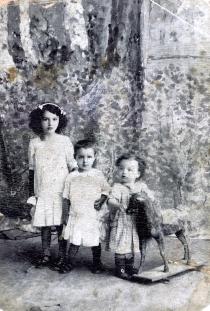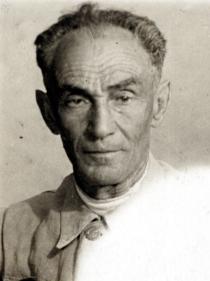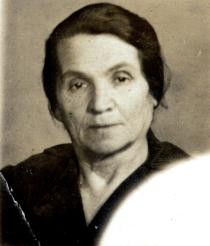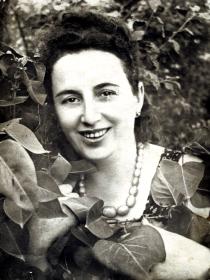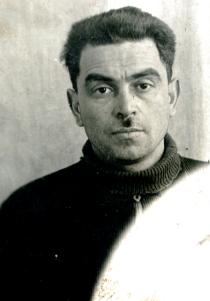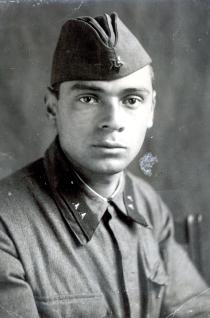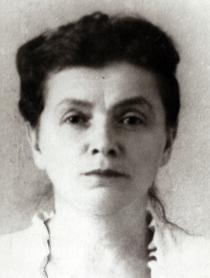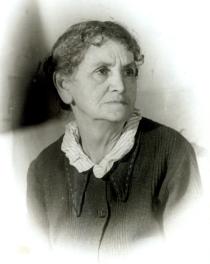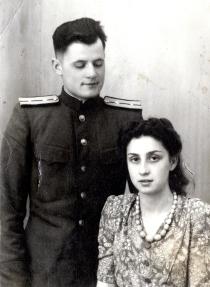
Basia Gutnik
Kiev
Ukraine
Interviewer: Zhmyr Oksana
My family background
Growing up
During the war
Post-war
My husband Vladimir
Our children
Glossary
My name is Basia Gutnik and I was born in Kiev in 1928.
My maternal grandfather told me that he and my grandmother
came to Kiev from Rakitnoye in 1909. Perhaps they were running away
from pogroms,1 but I don't know for sure. Mama was 5 years old
then. To obtain the right to reside in Kiev, they needed to have
their child study in the grammar school. Jews were only allowed to
reside in Podol2 - this was their residential area3. My
grandfather rented a house in Podol and my mother went to grammar
school. Almost everyone who lived in that house was Jewish. Only
the janitor was Russian. We also had one Russian and one Polish
neighbor.
The family was poor. My grandfather was the only family member
working, and my grandparents had three children to suppport. In
addition, both my grandmother's and grandfather's mothers were also
living with them. I don't remember when they died. Grandfather
managed to provide for his family and pay the rent. His name was
Aaron. He was born in 1880, I believe. He was an educated man. He
knew Hebrew and read the Torah. He worked as a cashier in a bank.
He was a very honest man. My grandmother said that whenever there
was a theft of money in his office, never was suspicion cast on my
grandfather. The idea that he could be a thief was simply
ridiculous. His colleagues would donate money in the amount that
had been stolen from him and return it to the bank.
While my grandfather was alive, the family observed the Jewish
traditions. I remember my mother's brother and sister and their
families visiting us at Pessach. We all assembled and my
grandfather put on his thales and said a prayer. We had matzoh and
wine. My mother's family celebrated many holidays, including the
Sabbath, but I remember only Pessach. My grandfather tried to raise
me as a Jew and told me about the Torah, but I don't remember what
he said. I was too young to take any interest in such subjects. In
the 1930s the practice of any religion, including the Judaism, was
eliminated from our country4. And my mother's parents realized
that their children might be at risk if they insisted on their
religiosity. So, nobody forced us to pray or to observe any of the
Jewish traditions. My grandfather died around 1936. The Jewish
ritual requires that one sit on the floor for six days, and that
the oldest family member read a prayer. My mother's brother,
however, didn't know anything about this ritual, and so my
grandmother and I went to an old man who did, and my grandmother
ordered a prayer. She herself sat on the floor near the tiled stove
for the six required days. My grandfather was buried at the Jewish
cemetery in Lukianovka. It was closed after the war. My mother's
sister Luba moved his grave to the Baikovoye cemetery where my
grandmother was buried.
My maternal grandmother, Sima, was born around 1884. My
grandmother had a great sense of humor. When I asked her about
pogroms, she used to say "Well, the pogroms... they robbed and beat
people... especially Petlura gangs5. But life went on and we had
to go on with our life." I must explain here that the worst curse
one can make in Podol is to call someone a "petlurovets". My
grandmother could write Russian very well. As for her religiosity,
while my grandfather was alive she observed all the traditions
assigned by the Torah. After he died, she occasionally went to the
synagogue. She had no profession. She was a housewife and looked
after her husband and children devotedly. After her husband died,
she dedicated all her time to her children and grandchildren.
My grandmother had three children: my mother, Luba and Matvey.
Matvey was born in 1908. He was very handsome. He finished grammar
school and then received further education at the Kiev Polytechnic
Institute. It was difficult to gain admission into this Institute
in the 1920s. Only the children of workers and peasants could be
admitted. My grandfather was a clerk. The husband of my
grandfather's sister was a veteran of the Great October Socialist
Revolution. He and some Party official helped my grandfather to
obtain a certificate stating that he had participated in the
October Revolution. With this certificate, Matvey was able to study
at the Institute, and he graduated from it very successfully. He
got a job assignment as a shift engineer at the KPP6 and married
a very nice woman named Anian. They led an ordinary life, went to
the cinema and to the theater, and celebrated the Soviet holidays.
When the Great Patriotic War began in 1941 ?.) and the Germans were
approaching Kiev, Matvey evacuated his family, his sister, her baby
and his mother. He remained in Kiev to blast boilers at the KPP.
They completed their task and were going in the direction of the
front when they bumped into German military. The Germans let the
other workers go, but shot Matvey because he was a Jew.
Matvey had two sons. Matvey's eldest son, Rudolf, followed in
his father's footsteps by studying at the Polytechnic Institute.
His grandmother's name was Riva-Gisia, and Rudolf received his name
in her memory: the first letter of their names is the same - such
was the tradition. After the war, Rudolf worked at the heating plat
in the Solomenka district of Kiev. He died of a heart attack when
he was 60.
Matvey's second son, Valentin, was born fatherless. Matvey's
wife, Ania, was in the last moth of her pregnancy when the war
began. Valentin never knew his father. While my aunt was alive we
got along well.
Aunt Luba was born in 1907. She studied at grammar school and
then at the Ukrainian secondary school. She couldn't enjoy her
youth because of the civil war and the devastation which followed
(1917 - 1921). After finishing school she entered Kiev's
Pharmaceutics Institute and then worked at the pharmaceutics
factory. She married in 1933. Her husband's name was Alexandr
Morozov. He was Russian and a very decent man. He came from the
Crimea and was educated at the Kiev Construction Institute, but he
didn't have an apartment, so he rented an apartment from my
grandmother. Before the war, he worked as a construction engineer
in Kiev. In 1934 their son Mara was born. Alexandr was the first to
go to war. On 22 June7 the war began, and he was summoned on 24
June. Luba and all the other tenants of our house went to see him
off to the recruitment office. We heard later that in a few weeks a
splinter hit him on the breast, on the left side, and lodged
underneath his heart. At that time doctors didn't perform surgeries
on the heart and, besides, the splinter was too close to the heart
to be operated on. Alexandr became an invalid. He was treated in a
hospital in the Middle East and then returned to Kiev. He lived
with this splinter in his breast until 1972.
At that time they didn't perform surgeries on the heart
and, besides, the splinter was too close to the heart. Alexandr was
invalid of the 1st grade. He was in hospital in the Middle East and
then he returned to Kiev.
In the summer of 1941 Matvey was supposed to send his family
along with other KPP employees' families on a barge. He sent his
wife and children, and my grandmother was supposed to go with them
while Aunt Luba and her son were to wait for the next barge. But
grandmother refused to go without her daughter. Later, Matvey sent
Luba and Mara and my grandmother to the village of Georgievskoye,
where Luba's husband picked them up and took them to Kokand where
he was staying in the hospital. They all stayed in Kokand until
after the war. Luba worked as a pharmacist in the pharmacy at the
Zaitsev hospital. At first, her family rented an apartment in Lenin
Street, then for a while moved in with us. Then, finally, Alexandr
received an apartment. The address was No. 2, Andreevskiy spusk.
After his father died Luba's son changed her apartment to
the one that was near his house. Aunt Luba's family did not celebrate
religious holidays. Like many other Soviet citizens, they had
parties or went to the cinema. Mara graduated from a Ukrainian
secondary school and then studied at the Geology College.
Afterwards, Mara worked for a year, but realized that his job
wasn't quite what he wanted to do - he liked having comforts in
life. He married a Russian girl whose parents were opposed to her
marriage with a Jew. Before long, they separated. Mara was working
at the Kremechug hydropower plant where met his future wife, a
Jewish girl twelve years his junior. They have two children. In
1996 they emigrated to Germany, although Mara had a good life here
in Kiev. He had his own business and good business contacts in
Kiev. He was known for his decent personality and expertise. I
asked him why he was leaving Kiev. He said his children wanted to
go. He visited Kiev in 1998.... He misses Kiev a lot.
My mother Hana Tabachnik was born in Rakitnoye in 1904. At the
age of five she attended the grammar school in Kiev, but she didn't
understand a wordk of Russian. (Tthere were only Russian grammar
schools in Tsarist Russia, but her family only. spoke Yiddish. She
had a music teacher who came to her home to teach her. My
grandmother was so proud of this. Besides the music teacher, an
Italian teacher also came to give her lessons in how to use her
voice - she could sing well, but was too shy to sing in public.
When my parents were children, they lived in the same street, and
of course, they met. My mother was very pretty and my father was
quite handsome. They were a beautiful couple. Both were 21 when
they married in 1926. My mother told me that they had a Jewish
wedding with the huppah in the bridegroom's yard. Frania, my
father's sister, said to her mother that this was the last Jewish
wedding they would be having, and that her mother would not arrange
anything like that for her. I've also seen once how they installed
the huppah. We had a butcher in the yard and his daughter was
getting married. All the village people came out to look - it was a
big rarity in the 1930s. They installed a tent on four beams in the
middle of the row, and the bride and bridegroom went there and
prayed. Mama and Papa were also wed in this manner.
My father's parents came from Radomyshl. I don't know why they
moved to Kiev. My grandmother Revekka was born in 1885 and my
grandfather Iosif was born in 1882. My paternal grandparents spoke
fluent Yiddish and Russian. My grandfather's name was Iosif-Alter.
My paternal grandmother explained to me that when children died
their parents gave a second name to the surviving child so that the
next one wouldn't die. My grandparents were married in Radomyshl,
Ukraine, when about their lives many times, but they wouldn't
tell me anything. In Kiev my grandfather rented a room in Podol and
they lived there until the end of their lives. My grandfather was a
railroad forwarder in Radomyshl. He worked very hard. They married
on 7 January on the Russian Orthodox Christmas, because it was an
official holiday and my grandparents thought it was good to have
their wedding celebration on this date. I don't know the year of
their marriage, but I remember that they celebrated the 35th
wedding anniversary before the war. My grandmother was moderately
religious and observed some of the Jewish traditions. She was
careful about having separate dishes for dairy and meat products.
My grandfather, however, didn't believe in God. He just loved fried
fat, and my grandmother was very concerned that nobody else should
use the same frying pan, especially the children, and she always
pushed this frying pan to the farthest corner of the stove. Their
children grew up to be atheists.
My grandmother was a heroic woman. She was a support to
her whole family. Whenever they received food during WWII, she
would divide it equally among each member of the family. When there
was sugar she would give everyone their share and keep none for
herself. If one asked, "How about you?" she would answer, "I don't
like sugar." She was a very handy cook. She could make cutlets from
potato peels or flat bread from sunflower waste. Frania told me
that when my grandfather lost his job he was so upset that he kept
repeating in panic, "What do I do now? What do I do," but my
grandmother didn't say anything - she just got some clothes
together to take to the village to exchange for food, walking there
with her older son. And the rest of her family just sat and waited
for her. She could adjust to any circumstance. And she never knew a
life of plenty. Such was her destiny. My grandmother died in 1951.
(Photo3) My aunts told me that when she lay dying, until her last
moments her eyes were gazing at the portraits of her sons. My
grandfather died in Charjou during the evacuation in ? 1942 and
was buried there.
My grandmother had five children. Grigory, my father, was the
oldest, born on 4 October 1904. He died in 1944. Debora (1907 -
1981), Fania (1909 - 1961), Maria (1911 - 1999), and Yan (1913 -
1941) followed.
The oldest daughter, Debora Gutnik, and my father were close
friends as well as siblings. He often wrote her letters... when
they were away from one another, even when he was at the front
during the war. She studied at grammar school in Podol, and in 1931
she and Luba -- they were friends -- graduated from the Kiev
Pharmaceutics Institute. They worked together for some time as
shift chemists at the Lomonosov plant at Kurenyovkar. Debora met
her future husband, a Ukrainian named Leonid, in Kanev. She got a
job assignment there as director of the sanitary and
epidemiological facility. He was a high official, and when mass
arrests began8, he ... ran away from Kharkov to Kanev and worked
there as a turner. He was already married. Debora soon had a son.
It was a scandalous situation for its time. They were living
together when we arrived in Kharkov in 1941. Leonid's wife had died
before that time- she had been ill. In 1942 Debora came to Maria in
Minusinsk with her son, and in 1943 she moved to Kalinin - her
husband had a job there with the hospital since the beginning of
the war. Debora got a position as Deputy Director of the hospital
pharmacy. Debora's family travelled from one town to another along
with the hospital. In 1944 her daughter was born in Rzhev. They
were at Daugavpils, Latvia, at the end of the war. In the spring of
1945, Debora returned to Kiev with her family. Her husband got a
job as a turner at the "Geophyspribor" plant, and Debora went to
work as a pharmacist at the pharmacy. My aunt loved to read
Russian, Ukrainian, and foreign literature. She sang beautifully
and played the piano. She had three myocardial infarctions and led
a very quiet life. She rarely went to the theater, although she
loved it when she was young. Her husband died in December 1958 at
the age of 63. They never observed any Jewish traditions or
celebrated religious holidays. Debora could understand and speak
Yiddish very well, but with her family she spoke Ukrainian and
Russian. Her son Vladimir was educated at the Vassilkov Pilot
School as a mechanic, and her daughter Yanina graduated from thee
Kiev Medical School and became a lab assistant. Debora died in
September 1981.
Another of my father'sisters, Frania Gutnik, who was born in
1909, must have studied at the secondary school, but I don't know
for sure. After school, she took a course in typing. She was
unhappy in her love life. She dated someone in the 1920s, but I
know no details. They say she even had an abortion and that her
lover then married a rich girl. Frania never married. She worked as
a typist before the war at the Vehicle Yard in Kiev. During the
evacuation she worked at a Soviet farm, excavated trenches, and was
involved in the construction of fortifications. When we were in
Inozemtsevo in the Caucasus, Frania went to the front with the
SMERSH units9. She had an affair with a married man at the front,
but terminated their relationships after the war. She didn't want
to destroy his family. The war was still going on when Frania
returned to Kiev and began to work as a typist at the prosecutor
office. She lived with her mother and her sister Debora's family.
There was a horrible famine after the war in 1946-48. There were
endless lines for flour and sometimes people had to stand there for
a whole day. Frania gave everything that she received through her
food ration cards to her mother, sister and nephews. My grandmother
used to exchange something from the package for bread. Frania
suffered a lot when her mother died. But she was a very sociable
person - she always had guests and parties where she and her
friends danced and sang Ukrainian and Soviet songs. She was an
atheist. She dedicated the rest of her life to her sisters'
families. She died from a heart attack in 1961.
Maria Gutnik, my father's younger sister, finished secondary
school in Kiev and met a handsome Jewish young man named Semyon
Kanevskiy who came from Kiev. He worked at the mill like everybody
else in his family. I don't know anything about his parents. Maria
married him in 1932, right when the Podol was flooded. They didn't
have a wedding party, but they sailed to the registry office on a
boat. Semyon went into the army. He completed 7 years of school. He
was goal-oriented and hard working, and he managed to graduate from
the Political Academy in Leningrad. He took part in the Finnish and
Great Patriotic War holding the position of Commissar of a
regiment. After the war, he served in Brest and Kurily. They
returned to Kiev in 1952 and he worked at the Otradny village as a
medical tutor at the military medical school. He retired in the
1970s with the rank of Colonel. He died in 1986. Maria was a very
kind person and she always tried to make everyone feel comfortable.
She worked at the military hospital in Essentuki for a short time,
as a supervisor of a shop in Minusinsk at the Stavropol Theater,
and then was a housewife and followed her husband in his constant
moving around. They didn't observe any Jewish traditions or
celebrate Jewish holidays. They often spoke Yiddish to one another.
They had many friends. Nationality didn't matter to them, and there
were always many people in their apartment on Soviet holidays
getting together to party. Maria had one daughter, Tatiana, who was
born in 1946. She graduated from the Medical School in Kiev.
My father's brother Yan Gutnik (1913 - 1941) graduated from
the rabfak10 , or trade school,) and gained admission to the
Institute of Light Industry. He was single. Yan's co-students used
to get together at our home, my maternal grandfather's place. They
had disputes and discussions and discussed books they had read and
performances they had attended. Sometimes they worked as a troupe
at the Jewish theater, in a building which is now the Brodsky
synagogue. One of Yan's friends was Russian and didn't understand a
word of Yiddish. Yan and a few other young Jewish men taught him a
few words and he shouted them out with everybody else, though he
didn't know what they meant. We were poor, but we had a rich
spiritual life.
Yan went into the army in 1939, along with his co-students.
Their mothers were all missing them and crying after them, but my
grandmother said "Well, what are you crying about? There's no war.
They will serve their term and come back!" But, unfortunately, the
war began when it was time for him to demobilize. I believe he
perished somewhere in the vicinity of Viasma. We received only one
letter from him when during the evacuation. All our neighbors cried
as they read his letter. We were told about it when we returned
after the war. Yan perished in 1941, and we don't know where he was
buried.
My father, who was born in 1904, studied at a commercial
school and worked at various places. After their wedding in 1926,
he and mama lived with my maternal grandparents. I was born in
1928. I was the only child in the family. I finished my first year
in the Jewish school at Podol. I was almost 8 years old when I went
to school, but my parents said they would take me back home if I
couldn't cope there. After a year at the Jewish school, I attended
the Ukrainian school which was located directly across the street
from our home. My aunts and uncle and my father's parents lived
within a half block of the school. So after classes I faced a
dilemma about where to go. I liked to go to my aunts' place. I
liked to listen to their discussions about books and performances.
I went to the theater rather often. The Cinema Theater "Oktiabr," a
very posh cinema, was built before the war. My friends and I went
there almost every day. I finished the 7th grade right before the
war. We lived in a four room apartment. My grandmother occupied one
room, my parents and I another. Mara and his mother lived in one
room and the fourth room was a living room. Our family always got
together for dinner. In our room we had two beds. My parents' bed
was nickel-plated. There was a table in the middle of the room and
a huge rubber plant beside it. After my grandfather, died I moved
into my grandmother's room. The furniture included an old leather
sofa, an antique cupboard, a red piano--my mother played the piano--
and my grandmother's bed. There was also a very beautiful tiled
stove. We liked to celebrate the New Year. In 1936 Stalin allowed
Soviet citizens to have New Year trees. My paternal grandmother
used to make all the decorations herself, and my maternal
grandmother always admired how handy she was.
During the famine11 of 1933, Papa worked at the creamery. He
used to bring us butter, soap and sunflower seed husk to burn in
the stove. We exchanged the soap and butter for bread and flour.
Mama didn't work outside the home. She didn't have a profession.
She was a homemaker and a good wife to her husband. At the age of
30 she was diagnosed by doctors as suffering from heart disease.
Papa was a very devoted son. He used to visit his parents
every day. He also supported them. He gave money to my grandmother
to go to Essentuki to cure her liver. Once, grandfather was in a
car accident and was taken to the hospital. When the doctor asked
him whether he needed crutches, he pointed to his sons and replied
proudly "Here are my crutches, one son and another". He was very
proud of his sons. My father and his wife lived with his wife's
parents, and since her father was religious, they observed all the
Jewish traditions and celebrated holidays. But my father didn't do
this due to religious convictions, but in order not hurt his father-
in-law's feelings. He loved to read, and read fiction, scientific
and philosophical literature, and discussed it with his brother and
sisters. My parents and I celebrated the Soviet holidays - on the
1st of May we attended the parade and then went into the woods.
When the war began my father was not subject to recruitment.
He went to build fortifications in the outskirts of Kiev. When the
Germans were close, he returned home. Frania was working at the
vehicle storage yard. All vehicles were to be mobilized for use by
the army and moved to Kharkov. Frania was allowed to take her
family there. My grandmother was in poor physical condition then
and refused to leave. My grandfather said that the Germans were
decent people and wouldn't do them any harm. Frania said that even
so, she was still going to take them away. We put my grandmother on
a stretcher, loaded it onto a truck, and left: Mama, Papa and I, my
grandparents, Frania, Debora and her son.
Debora's future husband lived in Kharkov in a room in a
communal apartment. We stayed with him, sleeping on the floor.
There were evacuation points in all the large towns and we went
there. Mama, Papa and I and my grandparents were sent to the Soviet
farm "Gorky" in the Kharkov region. Debora and her son stayed in
Kharkov. We lived in a big room that had a stove. We shared this
room with two drivers and their families. They all went to work and
I stayed with my grandmother - by that time her health was
improving. The drivers, Papa and Frania went to work on the
fortifications near Kharkov. Once, when they returned at night, I
heard Papa telling my grandmother to start a fire in the stove so
they could burn their clothes, which were full of lice, and to heat
some water to wash themselves. They also said that the family had
to leave Kharkov. The drivers' wives and their children returned to
Kiev. The drivers went into the army. We went to Aunt Maria's -
Papa's younger sister - in Essentuki. But we were not allowed to
stay in Essentuki, and had to go to Inozemtsevo nearby. We rented a
room and lived there for several months. In 1941 Papa got a job at
a military plant. Then he said he was ashamed to be in the rear any
longer. In 1942 he received a subpoena to appear at the recruitment
office in Mineralniye Vody. Maria and I went to see him off. Mama
and grandmother were hysterical and stayed at home. Papa perished
in Poland in 1944. As for Yan, nobody heard from him for quite a
while.
The four of us, Mama, my grandparents and I stayed in
Inozemtsevo. One day somebody told us that there were no
authorities left in the town, so we packed our backpacks and
prepared to leave. We wanted to go to Aunt Maria in Essentuki. All
around us there was panic and crowds. The patients from the
hospital were walking past our house. The patients caught some
horses and found carts. We threw our luggage onto these carts and
moved on. We spent the nights in the open air and dug up vegetables
from gardens to make something to eat. In this way we reached
Nalchik. The situation there was panicky as well, and we were told
to continue on to Ordjonikidze. When we reached Ordjonikidze the
authorities there summoned whomever possible into the army. The
rest of us boarded the trains heading for Middle Asia. My
grandfather fell ill on the way. His legs swelled up. We reached
Charjou, where we met acquaintances from Kiev. They told us to stay
there. My grandfather had contracted spotted fever. He died within
a month. But how were we supposed to bury him? The Uzbek people do
not have the tradition of burying people in coffins. Mama went to
the factory and explained that grandfather had two sons on the
front. The director of the factory felt sorry for us and gave an
order to make a coffin. But the Uzbek people did not want to carry
this coffin to the cemetery, so Mama and I tried to carry it
ourselves, and somebody helped us along the way. Before he died,
grandfather recalled his sons shouting, "The second front! The
second front!" He was probably hoping that the Americans would open
up a second front and defeat the fascists, so that his son would
return home. We buried my grandfather and our acquaintances from
Kiev even installed a monument on his grave. Mama and I went to
stay with my aunt Luba and my mother's mother in Kokand. But my
mother was suffering from the climate and spent most of the time in
the hospital, all swollen. As soon as she got better, she and I
went to stay with Papa's sisters. Mama got a job there, but I don't
remember what it was. When we got to Stavropol, Mama got a job as a
clerk in the hotel. My paternal grandmother went to stay with
Debora in Minusinsk.
We lived in Kokand for some time and I even went to study
there at the Geological College. In 1943 Mama and I went to
Minusinsk. Maria and Debora were living there. Then the Germans
began to retreat, and the Stavropol Theater moved back to
Stavropol, and we went along with it. Vera and her family stayed in
Minusinsk. Our trip to Stavropol took two weeks and we got lice.
Upon arrival we found accommodation at the hostel of the Stavropol
Theater. The front was nearby and Frania visited us to help us a
little. She used to bring us food. In Stavropol I attended the 9th
grade of the Russian secondary school. In 1943 Kiev was liberated.
We ran to the evacuation point to get permission to go home, but
they wouldn't give it to us. We stayed in Stavropol for another
year.
In 1944 we were allowed to return to Kiev. Neither our
apartment nor my grandmother's was available. Luba and her husband
received an apartment in Lenin Street. There was a public toilet
underneath. Luba and her husband, Mara, my grandmother, Mama, Maria
and I moved in there. We had to go to court to get back my maternal
grandparents' apartment. There were two Russian women and their
families living there. The decision of the court was positive for
our room and my Aunt's room, but we didn't get back my
grandmother's apartment. When we moved back into our rooms in the
apartment those women who were living there ran into the street
screaming, "Help! Zhydy are throwing us out of our apartment!" and
all the invalids attacked us. It was a nightmare.
One day after the war my two grandmothers went to the only
functioning synagogue in Kiev on Yom Kippur. It was a memorable
visit. The people there mourned for the deceased and those
exterminated in the Babi Yar12, and people were fainting and
screaming. I said, "Why did you go? What did your God give you?
One of you lost one son, and the other lost two!" Grandmother Sima
replied, "Well, you know, at our age we need to have faith and go
to the synagogue."
Mama got a job at the "Metiz" plant in Kiev which made metal
products. She was a laborer and then got promoted to the department
of ready-made products. I remember she brought home defective
spoons and my grandmother sold them to buy some food at the market.
Later, Mama got a job as a night nurse at the kindergarten.
In 1946 I visited my aunt Maria in Brest, Belarus. My mother
and grandmother stayed in Kiev. I got a job at the pharmaceutics
agency in Brest. I also took a course in English and met my future
husband Vladimir Fadeev there. He was attending an evening school
at the House of Officers. We were meeting at dancing parties,
because the only entertainment in Brest was theater and dancing. We
decided to get married.
Vladimir was Russian and was born in Kiev in 1925 He graduated
from secondary school. His father Ivan --I don't remember any
details of his biography-- worked at a military plant and his wife
was a housewife. Vladimir had a brother named Leonid, who was born
in 1939. Vladimir was like any other boy in his childhood. He went
swimming in the Dnieper River, was fond of the cinema, and was not
particularly fond of reading. He finished the 9th grade before the
war. After the war began, all teenagers and men not subject to
recruitment were taken away from Kiev. I saw them marching when we
were on our way to Kharkov. The men were taken outside Kiev and
told to go anywhere but Kiev. Vladimir decided to go back to look
for his parents, and was captured by the Germans on the way back,
along with some other boys. The Germans gave the order to take them
to Bucha and shoot them. But on the way, the German guard stopped
the truck and told them to get out of his sight. Vladimir ran to
his home, but there was nobody there - his parents and his younger
brother had been evacuated to Gorky. Vladimir got to Gorky on a
flat railcar. When he arrived, he found the house where the
evacuated were staying. His father was a janitor there, but he
didn't recognize his son - he was dirty and lice ridden. Vladimir
stayed with his parents and worked at the mine factory in Sormovo.
He stayed there every night, coming rarely to Gorky. When he did
visit, he brought an additional rationed food package for his
brother. When it was time for him to go into the army, the
management wouldn't let him go. After the war, he gained admission
into the Communications Department of Murom Military College. After
graduating in 1947, he got a job assignment in Brest. He wanted to
continue his studies and attended the Brest evening school at the
House of Officers. The Military College curriculum was the
equivalent of eight years in secondary school, and he needed ten to
gain admittance to the higher military college.
When I wrote mama to tell her that I was going to get married.
I didn't ask her consent. I guess she was opposed to my marrying a
Russian, but later she grew to like him very much. He was very
charming and kind. By the way, my Aunt Maria and her husband did
not oppose my choice. Mama came on a visit to meet him. She
couldn't give me any dowry. She brought me a housecoat made out of
parachute silk hand-painted by one of her acquaintances. This was
in 1947, and we married on 5 May 1948. We just had a civil
registration ceremony and then my husband had to leave for his
military unit. I went on business trip to inspect a pharmacy near
his regiment and he showed me where he lived - in the barracks with
soldiers. His bed was separated from the others by a curtain. Then
he came to Brest. Maria and Semyon were leaving for the Kuril
Islands. I lived with them, and since they were leaving, I was left
with no place to live. But we were lucky and got a room next door.
Our son Grigory was born in 1949.
We enjoyed life. Although we had a baby and my husband was
finishing the 10th grade, we still found time to go dancing. In
1950 Vladimir got his school certificate and was admitted to the
Electrical Engineering Academy in Leningrad, so we moved there.
This was during the period of the notorious "Doctors' Case13,
but I only read about it in the newspapers. I felt no prejudiced
attitudes by others towards me. We were close friends with some
families of Vladimir's colleagues, and this friendship continues
until the present. We lived in Leningrad for five years. We rented
a part of a room, and shared this room with our landlady. There
were six other rooms and a kitchen in this apartment. There was a
long hallway, a toilet, two stoves in the kitchen and one sink -
all for 22 tenants! But we got along well and my landlady used to
say, "You shall have long memories of this lodging". In 1955 my
husband graduated from the Academy and got a job assignment in
Uzin, a town near Kiev. There were hardly any comforts, and these
were outside, and there were people of all nationalities living
there. But again, we all got along well. We celebrated birthdays
and Soviet holidays together, and neighbors never refused to baby-
sit when we had a chance to go to the cinema or the theater. We
still have few friends in Uzin. Vladimir was there from 1956 till
1965.
Our younger daughter, Ira, was born in 1957. Mama was always
willing to help me and visited us in Brest, Leningrad and Uzin. She
loved her grandson. She always brought him picture books as
presents and read them to him. Sometimes he stayed with her. In
1957 Mama married Miron, a Ukrainian. I don't remember his last
name. He worked as a loader at a store, or something similar.
Later, he was put in jail for something or other and Mama had a
nervous breakdown. I took Mama to the neurological department of
the hospital in Uzin. In 1960 doctors diagnosed cancer. She died
that same year during the surgery.
In 1965 my older son Grigory completed nine years at school
and my daughter finished her first year. Vladimir got an assignment
in Mozdok in Chechnya. I stayed in Uzin until the end of the
academic year. Then Vladimir came to pick us up and we moved to
Mozdok - he had an apartment there. Grigory finished school in this
town and was admitted to the Geology College in Leningrad. After
graduating, he got an assignment in Altai. There he met his future
wife, a Russian girl who is also a geologist. In 1974 their
daughter Elena was born. Later, his former co-students helped him
to find a job in Petrozavodsk. They moved to Petrozavodsk and in
1977 their son Vladimir was born. My grandson and granddaughter are
graduates of the Pedagogical Institute in Petrozavodsk. My
granddaughter lives and works in St. Petersburg and my grandson
lives in Israel. He finished a course of study in design. My
daughter Irina graduated from a Russian school in Kiev in 1974, and
then from Kiev Polytechnic Institute in 1977. She got married and
her family moved to Riga in 1979. Her husband is a pilot. She
works as a manager. They have two sons born in 1980 and 1986. One
of them, Roman, went to Israel in 1997 to study, and stayed there.
Igor studies at school in Riga. My daughter is quite content with
her life in Latvia - she speaks fluent Latvian and English and
finding a good job is no problem for her.
In 1975 my husband retired and we returned to Kiev. He
got a position as senior engineer at the "Vulcan" plant. In 1979
the doctors found out that he had a malignant tumor, but he got
well and found a job in a TV shop. We went to theater performances
and visited our friends in Uzin, or they visited us. We read
newspapers. We often had our four grandchildren staying with us for
quite a while. My husband always spent a lot of time with them. He
died in 1998.
My children do not identify themselves as Jews. Perhaps
it is so because we never celebrated Jewish holidays or observed
any of the Jewish traditions. But if I did want to have it all
done, I do believe that Vladimir wouldn't have had any objections.
I never gave much attention to such things. It's an individual that
is interesting, not his nationality. We had Russian and Ukrainian
friends and there was never an issue of nationality. We spoke
Russian, putting in some Yiddish words that we remembered since we
were young. I feel sorry that I've almost forgotten the language.
My children are very interested in everything related to Jewish
culture and follow the events in Israel. They've always been open
about their Jewish roots. My two grandchildren live in Israel, love
it and are proud of it.
My husband never favored the idea of emigration - he
cared too much about the place he lived, and I was with him in this
regard. Regretfully, I've never been to Israel, but I hope to visit
my grandchildren there some day and see the country of my
ancestors.
1 In 1920s there were many anti-Semitic gangs in Ukraine
They killedJews and burnt their houses, they robbed their houses, raped women and
killed children.
2 Podol - was always considered and is presently considered by
the jewish region of Kiev
Before the war there lived 90% Jews.3 In the Tsarist Russia the Jewish population was allowed to live
at certain areas
In Kiev Jews were allowed to live in Podol, thelower and poorer part of the city.
4 In those years it was not safe to go to the synagogue
Thosewere horrific 1930s - the period of struggle against religion.
There was only 1 synagogue left of 300 existing in Kiev before the
revolution of 1917. Cult structures were removed; rabbis, Orthodox
and Roman Catholic priests disappeared behind the KGB (State
security Committee) walls.
5 SIMON Petliura (1879-1926) , ukrainian politician
MemberUkrainian social-democratic working party; In soviet-polish war has
emerged on the side of Poland; in 1920 emigrated. kill In Paris
from the revenge for jewish pogroms on the Ukraine.
6 Kiev power plant7 22 June 1941 at 5 o'clock in the morning the fascist Germany
attacked the Soviet Unioun without declaring a war
On this day theattacked the Soviet Unioun without declaring a war
Great patriotic War began.
8 In the mid-1930s Stalin launched a major campaign of political
terror
The purges, arrests, and deportations to labor campstouched virtually every family. Untold numbers of party,
industrial, and military leaders disappeared during the "Great
Terror". Indeed, between 1934 and 1938 two-thirds of the members of
the 1934 Central Committee were sentenced and executed.
9 Acronym that stands for "Death to the spies"
Security units inthe army.
10 Rabfak - educational institutions for the young people that
didn't have secondary education, established by the Soviet power
11 Artificial famine in Ukraine in 1920 that took away millions
of people
It was arraned to suppress the protesting peasants thatdidn't want to join collective farms. 1930-1934 - the years of
dreadful forced famine in Ukraine. The authorities took away the
last food products from farmers. People were dying in the streets,
the whole villages were passing away. The authorities arranged this
specifically to suppress the rebellious farmers that didn't want to
accept the Soviet power and join the collective farms.
12 Babiy Yar is the site of the first mass shootings of the
Jewish population that was done in the open by the fascists on
September 29-30, 1941, in Kiev
13 «Doctors' Case» - was a set of accusations deliberately forged
by Stalin's government and KGB against Jewish doctors of the
Kremlin hospital charging them with murdering outstanding
Bolsheviks
The «Case» was started in 1952, but was never finishedin March 1953 after Stalin's death.
